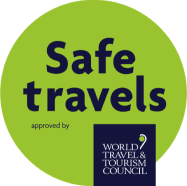What’s the currency in Mauritius?
The official currency in Mauritius is the Mauritian rupee (it’s not used anywhere else). One rupee divides into 100 cents and you’ll generally get a better rate if you wait and exchange your cash once you’ve arrived on the island. There are ATMs and currency exchange desks at the airport in Mauritius as you exit baggage reclaim.
What’s the weather like?
The island enjoys a mild climate all year round, with an average temperature of 25ºC (meaning that swimming is always on the cards)! Generally speaking, the best time to visit is between April and December. You can check out our Weather in Mauritius page for more detailed information.
What language is spoken in Mauritius?
Hello, bonjour, bonzour! Although the island’s official language is English, Mauritians also speak French and Creole.
What’s the time difference in Mauritius?
The time zone in Mauritius is Universal Time, plus four hours (GMT/UTC +4).
Is it easy to get around the island?
One of the great things about Mauritius is that everything is within easy reach on the island, so nothing is ruled out by long travelling distances. It takes around 1 hour 15 minutes to drive from the east to the west coast and around 1 hour 20 minutes to drive from the north to the south coast.
Buses travel almost everywhere (the two main bus stations can be found in Port Louis at Victoria Square and Immigration Square), and cars and scooters can be rented from local operators. Your hotel will be able to help with taxis and there are plenty of group minibus excursions that you can book. You can also book a private driver guide, but please ensure they have an official licence issued by the tourism authority. If you want to explore further afield, you can catch a boat to one of the offshore islands or board a flight from Mauritius to Rodrigues.
Should I look for suppliers with tourism licences?
Yes, we would recommend staying in accommodation and using suppliers with an official licence to ensure compliance with security standards and measures. The licences issued by the tourism authority include:
- Tourist Accommodation Certificate
- Tourist Enterprise Licence
- Pleasure Craft Licence
- Skipper’s Licence
If you are taking a boat trip, ensure it has a registration number beginning with PC, which is assigned to those operating for commercial purposes. Follow the instructions of the skipper and staff and wear the lifejacket provided. Do not sit on the bow of motorboats and respect the rules when it comes to dolphins and whale watching.
Find out more about tourism licences.
Keep your possessions safe
As with any country, when you are travelling we recommend keeping your valuables as safe as possible. Use the safe provided in your hotel room or accommodation, keeping your valuables, passport and money out of sight. Close all room windows and doors when you go out. If you lose your room key, report it immediately to your accommodation.
Are the beaches in Mauritius public?
Yes, all the beaches on the island are public. Beaches are accessible to all in Mauritius but, in front of private residences and hotels, the public can only stand or walk within the high water mark. Make sure your valuables are out of sight when relaxing on the beach. Do not purchase products or services from unauthorised persons and, if in doubt, ask for their operating licence. Always ask for the price before any purchase.
What is the international airport in Mauritius?
All international flights arrive at Sir Seewoosagur Ramgoolam International Airport (Mauritius Airport). It’s worth being aware that many flight booking apps show the airport is in Port Louis. In fact, the airport is actually in the southeast of the island, while Port Louis is in the northwest, about 50 minutes away. Sir Seewoosagur Ramgoolam International Airport is a modern and award-winning airport.
How much should I tip?
Tips are not mandatory in Mauritius but are welcome based on your appreciation. Some high-end restaurants may add a 10-15% service charge as standard, so it’s worth checking before you leave a tip.
Is bargaining acceptable in Mauritius?
In marketplaces, you are welcome to bargain with the stallholder. Always confirm the price before any purchase.
What is the emergency phone number in Mauritius?
Police: 999 or 112
Fire Services: 995 or 115
SAMU Ambulances: 114
National Directory: 150
Tourist Info: 152
Weather: 171 and 96 for cyclone reports
Airline information: 603 3030
Can I drink the tap water in Mauritius?
Yes, you can. Since 2012, the water supplied by the Mauritius Central Water Authority has been treated to meet the standards set by the World Health Organization for drinkable water.
What is the international dialling code for Mauritius?
+230
What kind of electrical plugs are used in Mauritius?
The electrical plugs used are the British three-square pin and two round pin plugs. The voltage is 220/230V.
What side of the road do you drive on in Mauritius?
Cars drive on the left-hand side in Mauritius, giving way to vehicles coming from the right. Visitors holding a valid driver’s licence issued by the relevant authorities have the right to drive while staying in Mauritius.
Are there any deadly animals in Mauritius?
There are no dangerous, deadly or poisonous animals in Mauritius. There are, however, some species with painful stings, such as wasps and bees. In some rare cases, these can cause allergies. Please consult a doctor or pharmacist if this happens.
Are there sharks in Mauritius?
The lagoons are protected by reefs, so the risk of shark attacks on humans is low and extremely uncommon. There are nevertheless a few creatures to watch out for when you are in the water, such as stonefish and lionfish, whose stings are extremely painful. Sea urchins and jellyfish can also cause a nasty reaction. The presence of jellyfish is usually indicated when it happens and is only occasional. It is recommended to see a doctor if you do get stung.




